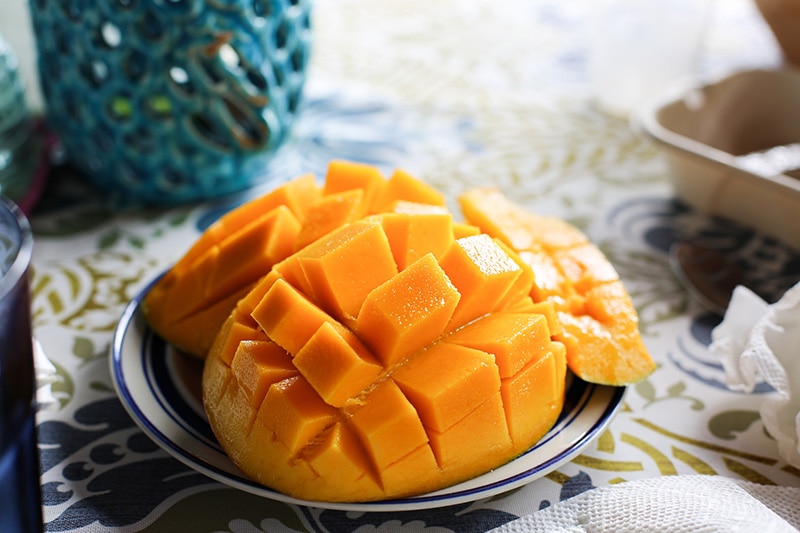
The information is current and up-to-date in accordance with the latest veterinarian research.
Learn more »
Parrots should eat a varied diet that consists of seeds, grains, fruits, and vegetables. They can enjoy many delicious fruits that humans enjoy, including mangoes. Mangoes are a healthy snack for parrots, and most parrots will appreciate this sweet treat. Just keep in mind that they should only eat a moderate amount, and mangoes should never make up the majority of your parrot’s diet.
Do Mangoes Have Nutritional Benefits for Parrots?
Mangoes have some nutritional benefits for parrots, as they contain a decent amount of essential vitamins and minerals. They’re an excellent source of vitamins K and C and contain high levels of beta-carotene, which is an antioxidant that fights free radicals in the body. Mangoes are also a good source of dietary fiber that can help stabilize the digestive system.
Image Credit: Jumpstory
How Many Mangoes Can My Parrot Eat?
Since mangoes contain a decent amount of natural sugars, parrots shouldn’t eat too many of them. In fact, a combination of fresh produce shouldn’t take up more than 30% of your parrot’s daily diet.
The amount of mango your parrot eats will depend on a variety of factors, such as their species and size. In general, smaller parrots can enjoy a small cube or two of mango a day, and larger parrots may be able to eat more. If your parrot has specific health concerns, such as obesity or a hormonal disorder, make sure to consult your veterinarian to determine if mangoes are a safe option for them or to find out how much is appropriate.
While there isn’t often any immediate danger to serving mangoes two consecutive days in a row, it’s often helpful to rotate your parrot’s selection of fruit. Some parrots can develop a taste for mangoes and not feel inclined to eat their regular food. Switching up the fruit you give your parrot can prevent pickiness. You may also find it helpful to save the tasty snacks for later in the day after your parrot has eaten most of their regular meals.
What’s the Best Way to Feed Mangoes to My Parrot?
Fresh, raw mangoes are the best form to feed to parrots. The skin is also edible and safe to eat. Just make sure to wash the mango thoroughly before feeding it to remove any harmful chemicals. It’s best to give chunks or slices instead of a whole mango as it is too large of a serving for them. Parrots also shouldn’t eat the mango pit.
Refrain from feeding your parrots dried mangoes and canned mangoes. These snacks have a higher sugar content and won’t provide any extra benefit to your parrot’s health.
Image Credit: Blanscape, Shutterstock
What Other Fruits Are Safe for Parrots?
Since it is recommended to feed your parrot a variety of fruits, it’s important to familiarize yourself with fruits that parrots can eat safely. Fortunately, parrots can eat most fruits as long as they’re safely prepared.
Here are some fruits that many parrots like to eat:
Apples
Bananas
Blueberries
Figs
Kiwis
Melons
Oranges
Papayas
Pineapples
Strawberries
When preparing fruit for your parrot, it’s important to remove any seeds and pits. Seeds from apples, peaches, and cherries can be a choking hazard, and some can contain small traces of cyanide. While your parrot isn’t likely to experience cyanide poisoning from eating a seed or two, seeds still don’t add any nutritional benefits to your parrot’s health. You’ll also want to cut fruit into chunks that your parrot has to chew, and feed them all in moderation.
Avoid Avocados
While parrots can safely eat many different kinds of fruit, they should not eat avocados. Avocados contain a toxin that can cause an upset stomach and other health complications for parrots. All parts of an avocado plant are toxic to birds and should be avoided.
Conclusion
Your parrot can safely eat a few pieces of mango as a snack or special treat. Mangoes have several nutritional benefits, but they also contain a decent amount of sugar. So, it’s important not to overfeed your parrot mangoes. Most parrots can enjoy eating a couple of cubes of mangoes a day. However, if you ever have concerns about your parrot’s diet and nutritional needs, don’t hesitate to consult your veterinarian to determine the appropriate amount of fruit your parrot can consume.
Featured Image Credit: Desirae Hayes-Vitor, Unsplash


.png?format=1500w)



